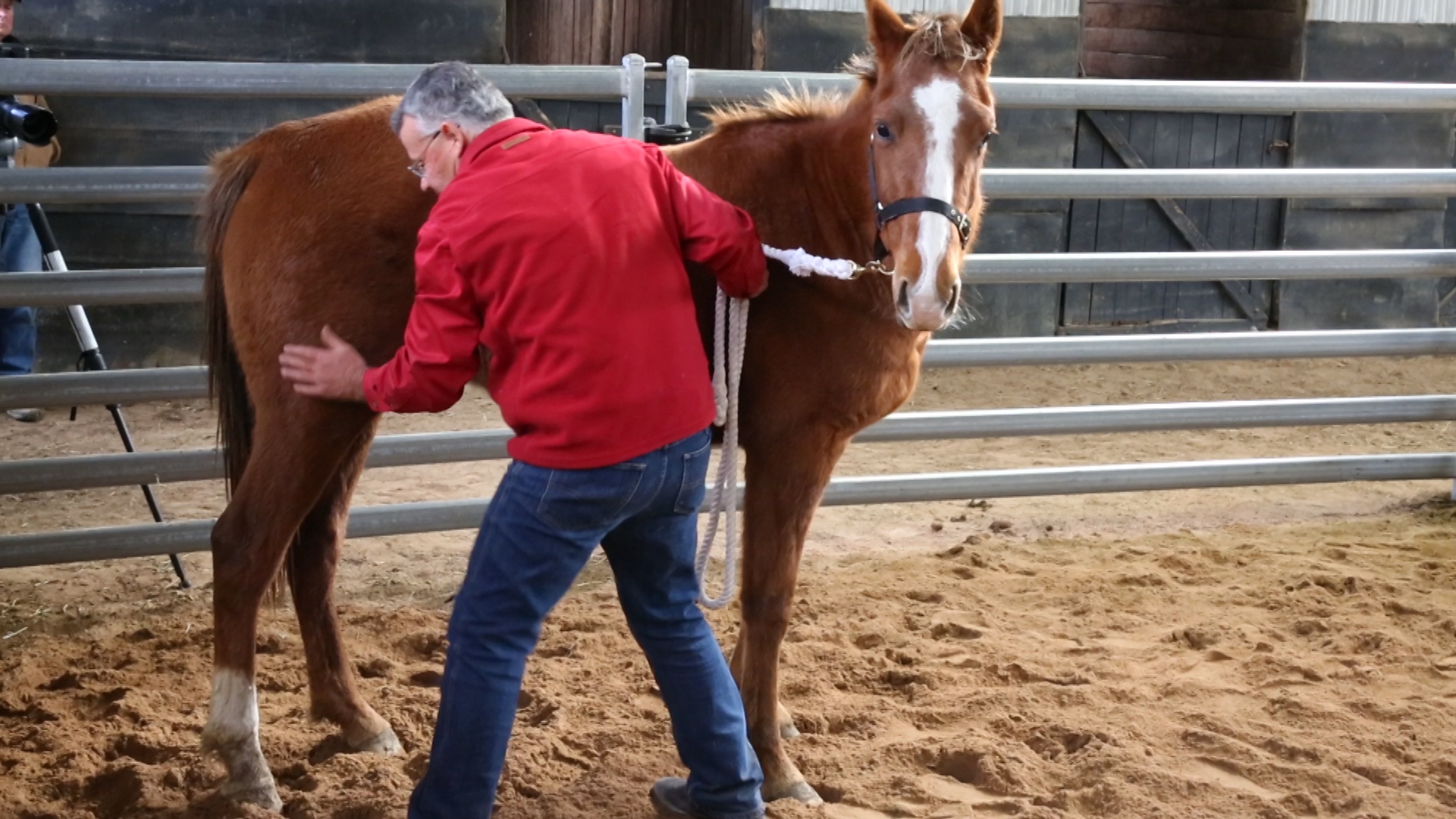Due to bad handling and bad training, thousands of horses never reach their full potential.
Many horses don’t make it past the ‘breaking in’ stage.
Many others are ‘blown up’ by the use of too much pressure and too much force during their training.
These days, trainers everywhere chase horses with flags, ropes and tarps.
Frightened horses are forced to run backwards in the name of horsemanship.
Countless young horses are saddled for the first time and let go to buck.
Some trainers advocate the use of hobbles, straps and ropes to handle a horse’s legs, others say tying a horse down on the ground will ‘cure’ whatever problem you may be having.
These trainers preach a rigid system of horse training where one size fits all.
If things aren’t working out, these trainers say it’s because ‘your horse doesn’t respect you’,
or ‘it’s in his breed’,
he’s ‘claustrophobic”,
he hasn’t been “desensitised’
or he has a ‘medical problem’.
We’re told that horses have different personalities and you must ‘establish yourself as the leader’.
Just because a famous trainer says something or does something, doesn’t mean it’s right.
Everywhere I go, I see horses that have been through this treatment.
Many of these horses are nervous and worried.
They don’t trust people and they’re always ready to kick, buck, strike and rush away.
The fact is, about eighty percent of young horses will adapt to bad initial training.
One way or another, most of them will work out what they’re supposed to do.
Some of these horses will respond better than others, however many will never reach their full potential.
The other twenty percent never get over the trauma of being bucked out and terrified with flags, ropes and tarps.
They’re unreliable as riding horses and are always nervous and worried.
Some are rejected all together.
Then there are the horses that make it through their early training but are pressured to perform by impatient riders.
It takes years to develop a good campdrafter, dressage horse or showjumper.
Often, people don’t want to wait, so they try and force horses to chase a cow when they’re not ready, or perform passage and piaffe too early, or jump too high too quickly.
I’ve seen horses spurred down the shoulder with sharp spurs to ‘make them turn’.
I’ve seen horses jerked relentlessly with severe bits to make them run backwards.
I’ve seen horses being ridden while a trainer on the ground whipped them relentlessly, trying to force passage and piaffe.
I’ve seen a trainer rap a jumping horse’s legs with a bamboo pole so ‘he won’t hit the jumps’.
The cruelty goes on and on.
Many horses can’t cope with such treatment and become nervous wrecks.
I’ve seen horses ‘freeze up’ and not move at all when they’re ridden into a yard with cattle.
Others rear, leap away and stop thinking all together.
I’ve seen showjumpers bolt and run off when faced at a jump.
The pressure applied to try and jump has been too great and the horse stops thinking and rears, runs off or bolts.
I’ve seen dressage horses so worked up that they try to jump out of the arena every time they’re ridden.
Many dressage horses have had too much whipping from the ground and I’ve seen them leap, rear, kick up and bolt whenever a trainer approaches.
Not every horse will be a champion.
However when a horse doesn’t improve or perform to their expectations, some trainers say it’s because the horse is ‘mad’, ‘stupid’ or ‘disrespectful’ and needs more pressure and punishment.
Many performance horses are ‘blown up’ and become rejects, simply from the use of too much pressure and force.
Just because a famous trainer does something, doesn’t make it right.
It’s never right to chase horses with flags, ropes or tarps at any stage of their training.
It’s never right to saddle a young horse and let him buck.
It’s never right to rope or strap any horse’s legs.
It’s never right to force horses to run backwards.
It’s never right to try and force horses to perform by relentless whipping and spurring.
Instead of using pressure and force, how about going to your horse and rubbing his head.
It doesn’t matter how old your horse is or what stage of training he’s at, rubbing his head can never be overdone.
I don’t mean rub his head for 10 seconds then move on to something else.
Spend a few minutes several times each lesson rubbing your horse’s head.
You might be surprised that your ‘mad’, ‘disrespectful’ horse is not mad and disrespectful after all.
In fact, you’ll find he’s a lovely horse when he learns to be confident and relaxed with you.

